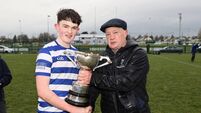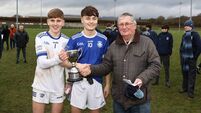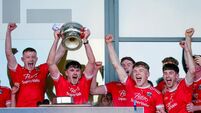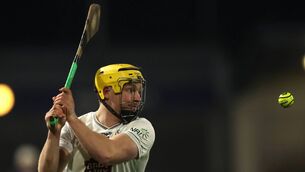Flanagan pleased with first outing
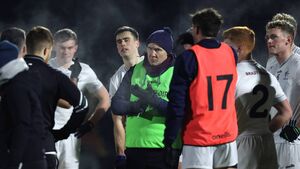
Kildare manager Brian Flanagan speaks to his players after the the challenge game in Cerdal St Conleths Park Photo: ©INPHO/Bryan Keane
There was a satisfied air about new Kildare manager Brian Flanagan after a first public challenge game against a “fairly loaded” Galway outfit.
“On an overall picture, first game out, a lot of lads first time playing for Kildare and wearing the white jersey, I thought they applied themselves brilliantly,” said the Johnstownbridge man. He felt his mix of youth and experience “stood up to it brilliantly, looked very composed, looked very at ease for a lot of the game.”
It was far from perfect, and no one would have expected it to be. Flanagan pointed to a “ten minute patch just before the end where we couldn’t get hands on ball. We lost a lot of kickouts long and they started picking off two-pointers and ultimately that was probably the difference. They also had more of a goal threat whereas we had one or two chances and didn’t take them. They had three and took two.” He agreed that they will need to bring some two-point shooting to the table, having seen Galway excel at that.
“It was maybe something that we need to look at and work on but when you’re in possession and in attack you’re always trying to get the highest percentage shot off and our lads structurally applied themselves very well but it’s giving them the freedom from here on in and use their initiative in the game.”
Flanagan has not yet released an official panel nor selected a captain but will have Caragh’s Ryan Burke and Darragh Swords coming into the panel after the end of their extended club campaign. Competition for places will be intense as we head towards the opening league game against Fermanagh on 26 January.
“We had five or six lads coming back from injury this week, we had another five lads played in the development squad game earlier today and got on very well. So, the panel depth and the experience lads are gaining, it’s been a good weekend for us.”
As regards the main topic of conversation, the new rules, Flanagan declared himself to be “in favour of them, I think the game needed it, I’ve said that before,” but believes the “real test for them is when there is proper jeopardy in games.” One early bugbear is the awarding of a 20-metre free for breaching the “three-up” rule even if Kildare were the main beneficiaries on the night. He doesn’t feel that punishment helps the game or fits the crime.
“It can be frustrating on the sideline and for fans watching on when play is stopped all of a sudden and nobody’s quite sure why it’s been stopped, and it’s brought a hundred yards down the far end of the field to be tapped over the bar. I don’t think, when that happens three or four times in a half, which it did today in the first half, it doesn’t add anything to the game. It breaks the flow of the game actually. I get there has to be a punishment in order to keep three up top but bringing it all the way to the 20-metre line for a tap over, and then re-set for a kickout actually takes the energy out of the game. And takes the energy out of the crowd.”
As regards the equally penal fifty-metre punishment for dissent of any sort, he sees that as within the control of players and management officials.
“There’s no point complaining about it. I know players were getting frustrated. ‘I just looked at him, I didn’t do anything,’ but you just can’t do that. You have to turn your back, walk away and get on with it. No matter how small the foul is, no matter how frustrated you might be you just have to re-set, park it, move on. That is a cultural change in the GAA, we can’t be opening our mouths on the sideline, the players can’t be arguing over any type of decision, good bad or indifferent.”
